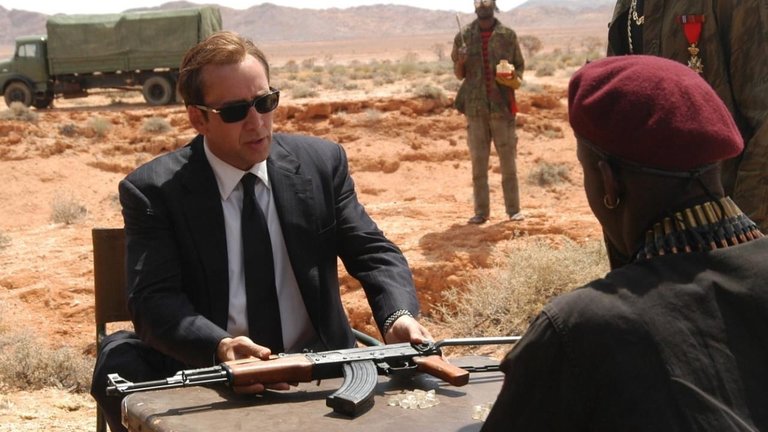
Two years ago, prisoner exchange, during which American basketball star Brittney Griner was released from Russian prison while notorious Russian arm dealer Viktor Bout was released from US prison, created a lot of controversy. But it also reignited interest in a film made nearly two decades earlier, which had been mostly underrated and underappreciated during its release. Bout allegedly served as a model or at least one of the inspirations for the protagonist of Lord of War, 2005 crime drama written and directed by Andrew Niccol.
In the film Nicolas Cage plays the Yuri Orlov, the main character who emigrated from Soviet Ukraine to New York in the 1970s as a child. As a young and enterprising man who witnessed an endless series of clashes between Russian-Jewish mafia members in the gloomy Brighton Beach neighborhood in the early 1980s, he comes up with the brilliant idea of earning a living by selling weapons. He quickly realises that the profit from selling Uzis on American streets is negligible compared to the possibilities offered by the global market with its countless wars. Unburdened by ideological, moral or any other qualms, Orlov slowly but surely builds a career as one of the biggest players in the arms trade, amassing wealth and Ava (played by Bridget Moynahan), glamorous model, as his trophy wife.
When the USSR disintegrates, Orlov finds a promised land in the form of millions of former Soviet AK-47 assault rifles and suddenly impoverished Soviet generals willing to sell them for a pittance in his now independent homeland. On the other side is a crowd of African "freedom fighters" like Liberian President Andre Baptiste (played by Eamonn Walker) who would arm drugged boys, the core of his army, with those same AK-47s. Orlov is constantly hounded by idealistic Interpol agent Jack Valentine (played by Ethan Hawke) who tries to enforce UN arms import embargoes.
Before his feature film debut, Niccol spent ten years making TV commercials and music videos, and it shows in the rather ingenious and effective opening scene that follows the path of a bullet from its production in a Ukrainian factory to hitting the head of an African boy. This introduction not only clearly shows what the theme of Lord of War is, but also how the author will not pay attention to narrative and style conventions in its depiction, at least in the way Hollywood has accustomed us to in its “message” films.
These conventions include treating such serious topics with creators wearing the beliefs of moral superiority on their sleeves and plenty of gravitas and pathos. Niccol, on the other hand, has turned everything around by making the protagonist out of character who would be the villain in an convential Hollywood film, and by depicting his rise to the top through a series of surreal black humour vignettes in the style of Scorsese's Goodfellas. This is supported by the decision to present the story through the narration of the main character, full of sarcastic comments about the fact that the end of the Cold War brought even greater chaos and misery to the world instead of peace and prosperity.
What makes Lord of War an exceptionally effective film is the fact that many of the surreal situations and characters depicted in the film are inspired by real events. Accordingly, Niccol decides to break another convention and deprive the film of either a traditional happy ending or a moral ending in which the slimeball gets what he deserves. The reason for this is also Niccol's pessimism, which he hadn’t opportunity to express in his original screenplays for The Truman Show and Terminal, artificially sweetened by meddling of Hollywood studio executives.
Niccol's tendency to see the world and people in it as they are rather than as they should be also applies to himself. The subplot related to Orlov's wife will remind many of some of the circumstances surrounding the filming of Niccol's previous film S1m0ne, which are often considered the reason for its failure. Lord of War is surprisingly good, but not without flaws. The most striking of them is the occasionally uninspired casting - Jared Leto overacts in the role of Yuri's eternally "bad" brother - as well as the not quite ironed out characterisation of certain personalities, especially when the film starts to resemble a melodrama towards the end.
However, these flaws, are actually the least important reason why Lord of War didn't stand a chance of taking away Oscars and other prestigious awards from Syriana, The Constant Gardener and other politically charged thrillers Hollywood was making at the time. Instead, Niccol's work with its subversiveness was too bitter and politically incorrect pill for Hollywood and many other parts of cultural establishment who in mid 200s tried to reduce all the world's problems to the question of the party affiliation of the White House occupant.
"Lord of War", on the other hand, shows that even during Clinton's time, all sorts of shenanigans could happen around the world, just as the USA as the main producer of weapons was only the biggest among many other exporters of death to the Third World. The film also shows that wars and arms trade are just symptoms, not the cause of the problem, i.e. that all those who try to oppose this evil through some consistent respect for the abstract ideals of international law are doomed to have their crusade end as quixotic. The voting body of the Los Angeles Academy also probably didn't like the scene where Uzis are delivered to street gangs via synagogues.
This was also the reason why Lord of War wasn’t exactly a Hollywood production, i.e. why Niccol had to seek alternative sources of financing. In the audio commentary that comes with the DVD edition, Niccol claimed that there are so many of them that he really doesn't know who financed his film. The audio commentary also claims that the film could not have been made without the help of some characters who are the equivalent of Yuri Orlov in real life. Niccol also admits that he regrets not being a little braver and leaving scenes and dialogues in "Lord of War" that would have made it even darker and more subversive.
And this is quite a pity, especially in light of present-day circumstances, when the individual death merchants like Bout seem like a small fry compared to the corporations of military-industrial complex or politicians who unashamedly praise world wars as the best way to fuel some nation’s economies.
RATING: 8/10 (+++)
Blog in Croatian https://draxblog.com
Blog in English https://draxreview.wordpress.com/
InLeo blog https://inleo.io/@drax.leo
Hiveonboard: https://hiveonboard.com?ref=drax
Rising Star game: https://www.risingstargame.com?referrer=drax
1Inch: https://1inch.exchange/#/r/0x83823d8CCB74F828148258BB4457642124b1328e
BTC donations: 1EWxiMiP6iiG9rger3NuUSd6HByaxQWafG
ETH donations: 0xB305F144323b99e6f8b1d66f5D7DE78B498C32A7
BCH donations: qpvxw0jax79lhmvlgcldkzpqanf03r9cjv8y6gtmk9
Posted Using InLeo Alpha
